Shinkansen bullet train - 180 mph, smooth ride - amazing what a country that cares enough to invest in its transportation infrastructure can do, eh?
Whee!

Osaka - in a nutshell:

Ok, so I suppose this is where the "Hiroshima Entry" really begins.
So this is the entry about Hiroshima.
I've had great difficulty trying to frame this entry, because it is so easy to get wrapped up in discussing/analyzing/ranting about history, responsibiity, atrocity, etc...and for sure, if anyone *wants* to hear my take on Hiroshima, the firebombings, the Pacific War in general, I'm happy to respond "off the air," as it were.
The challenge, of course, is that I don't think those issues can be divorced from any meaningful reflection on visiting the city, especially this day. What struck me a great deal about the Peace Day ceremonies this morning was the intense effort to make it "apolitical" (e.g., no flags, from any country, were allowed on the grounds of the Peace Park), but such omissions also make a variety of political and historical statements in and of itself.
So for the moment, I'll just say, there are Japanese narratives of history that paint a very different picture of the events leading up to, taking place during, and that ended, the Pacific War. I was aware of these narratives long before I came to Hiroshima - they aren't even explicitly mentioned here in the city, although you can perceive their echoes if you know where to look. I will say that at least some aspects of these narratives are persuasive to me, and worth at least knowing about. You can ask me if you're curious, and if you wish, and you can make your own decisions about the info.
As a city, with which I have now only made the most passing acquaintance, Hiroshima seems oddly schizophrenic. On the one hand, it is a large city like any other large city in Japan, or in the developed world in general: if you were to be dropped into it tomorrow and not told its name, you would have absolutely no idea it was one of only two cities on the planet to have suffered nuclear attack. Skyscrapers, parks, stores, trams, factories, hotels, houses, traffic jams both automotive and pedestrian. Other than their slightly tough-for-me-to-understand regional accent, the people here don't look or act any different from anyone else I've met in Japan. There isn't rubble or ruins anywhere, and the memorials that do exist are in very specific places and hardly scream out at you. Life proceeds as it would in any other first world metropolis.
On the other hand, there are things you notice. When you do interact with the touristy parts of the city, you can see immediately how it has "branded" itself. Every map highlights the a-bomb site, the peace park. There are streets called "Hewia Dori" ("Peace Boulevard") and temples devoted to peace. Touristy stores offer "peace sholes" and other such trading-on-the-antiwar-brand stuff. It would be as if, post-9/11, New York reorganized its entire foreign tourism pull around Ground Zero...no, even more than that...think Gettysburg. For the people who live there, eh, whatever, it's your home city, in much the same way I really seldom if ever think about Boston's colonial history. But who the hell comes to Gettysburg s a tourist except to visit the infamous battle site? Who would ever have KNOWN about Gettsyburg otherwise?
And that leads to another strangeness: An awful lot of people in Hiroshima have a basic command of English, people you wouldn't expect to (i.e., not just in the tourism/hospitality field). This is a city used to Westerners coming, beckoning to them in a way that Japan's other major cities don't seem to feel the need to do. And of course, Peace Day is the day it kicks this process into highest gear: this is the cash cow, this is what fills the hotels and books all the taxis. The hotel in which we stayed was hosting an "American culture fest," showcasing everything from hot dogs in their restaurant to pictures of Dobie Gillis and Homer Simpson. "Come on in," everyone and everything seems to say. "We don't hate you. We're friendly."
The strategy struck me to be at the same time humiliating and extremely canny/mercenary. I found it fascinating.
While I came on August 5th prepared to face an aura of solemnity, the city, while clearly gearing up for a big event, seemed utterly (and therefore, to me, somewhat unsettlingly) normal. We had our predictable saga of getting lost in the Hiroshima JR station (which has, hands down, the most maddeningly useless and confusing directional signage of any building I've ever been in...I can't tell you how many times we walked around in circles, desperately trying to find the "North Exit," which is only labled "Shinkansen (high speed train) exit," even though all the other exits are labeled directionally, and even the Shinkansen exit isn't actually an exit....blaaah!). We got caught in a massive rainstorm. We ate at a restuarant simply because we were intrigued by the English sign, "We have a genuine British waiter," and true enough, they did).
The challenge, of course, is that I don't think those issues can be divorced from any meaningful reflection on visiting the city, especially this day. What struck me a great deal about the Peace Day ceremonies this morning was the intense effort to make it "apolitical" (e.g., no flags, from any country, were allowed on the grounds of the Peace Park), but such omissions also make a variety of political and historical statements in and of itself.
So for the moment, I'll just say, there are Japanese narratives of history that paint a very different picture of the events leading up to, taking place during, and that ended, the Pacific War. I was aware of these narratives long before I came to Hiroshima - they aren't even explicitly mentioned here in the city, although you can perceive their echoes if you know where to look. I will say that at least some aspects of these narratives are persuasive to me, and worth at least knowing about. You can ask me if you're curious, and if you wish, and you can make your own decisions about the info.
As a city, with which I have now only made the most passing acquaintance, Hiroshima seems oddly schizophrenic. On the one hand, it is a large city like any other large city in Japan, or in the developed world in general: if you were to be dropped into it tomorrow and not told its name, you would have absolutely no idea it was one of only two cities on the planet to have suffered nuclear attack. Skyscrapers, parks, stores, trams, factories, hotels, houses, traffic jams both automotive and pedestrian. Other than their slightly tough-for-me-to-understand regional accent, the people here don't look or act any different from anyone else I've met in Japan. There isn't rubble or ruins anywhere, and the memorials that do exist are in very specific places and hardly scream out at you. Life proceeds as it would in any other first world metropolis.
On the other hand, there are things you notice. When you do interact with the touristy parts of the city, you can see immediately how it has "branded" itself. Every map highlights the a-bomb site, the peace park. There are streets called "Hewia Dori" ("Peace Boulevard") and temples devoted to peace. Touristy stores offer "peace sholes" and other such trading-on-the-antiwar-brand stuff. It would be as if, post-9/11, New York reorganized its entire foreign tourism pull around Ground Zero...no, even more than that...think Gettysburg. For the people who live there, eh, whatever, it's your home city, in much the same way I really seldom if ever think about Boston's colonial history. But who the hell comes to Gettysburg s a tourist except to visit the infamous battle site? Who would ever have KNOWN about Gettsyburg otherwise?
And that leads to another strangeness: An awful lot of people in Hiroshima have a basic command of English, people you wouldn't expect to (i.e., not just in the tourism/hospitality field). This is a city used to Westerners coming, beckoning to them in a way that Japan's other major cities don't seem to feel the need to do. And of course, Peace Day is the day it kicks this process into highest gear: this is the cash cow, this is what fills the hotels and books all the taxis. The hotel in which we stayed was hosting an "American culture fest," showcasing everything from hot dogs in their restaurant to pictures of Dobie Gillis and Homer Simpson. "Come on in," everyone and everything seems to say. "We don't hate you. We're friendly."
The strategy struck me to be at the same time humiliating and extremely canny/mercenary. I found it fascinating.
While I came on August 5th prepared to face an aura of solemnity, the city, while clearly gearing up for a big event, seemed utterly (and therefore, to me, somewhat unsettlingly) normal. We had our predictable saga of getting lost in the Hiroshima JR station (which has, hands down, the most maddeningly useless and confusing directional signage of any building I've ever been in...I can't tell you how many times we walked around in circles, desperately trying to find the "North Exit," which is only labled "Shinkansen (high speed train) exit," even though all the other exits are labeled directionally, and even the Shinkansen exit isn't actually an exit....blaaah!). We got caught in a massive rainstorm. We ate at a restuarant simply because we were intrigued by the English sign, "We have a genuine British waiter," and true enough, they did).
We developed a darkly funny meme, whenever anything went awry: When a vending machine ate our money, when the hotel guy at first gave us grief about early check-out, when I lost the bag that had my pocket dictionary in it...when anything tempted us to get pissed off, we just turned to each other and said, "Gee, you know, this is the worst thing ever that's happened in Hiroshima."
At Hiroshima, for Peace Day (anniversary of the bomb)
Photos of modern-day Hiroshima -- a city like any other:
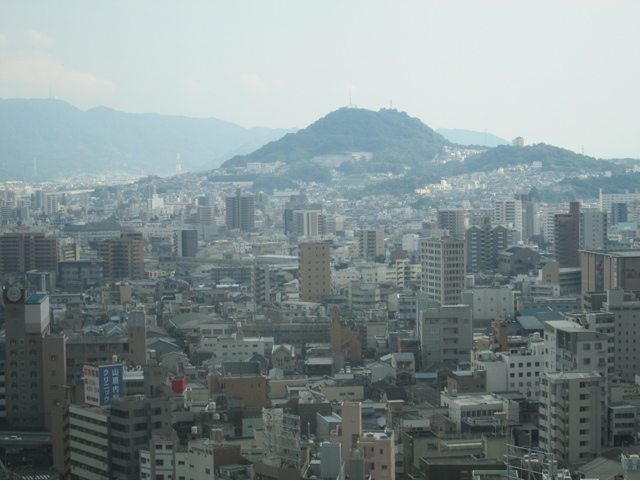


Ran unexpectedly into a Christian peace march:
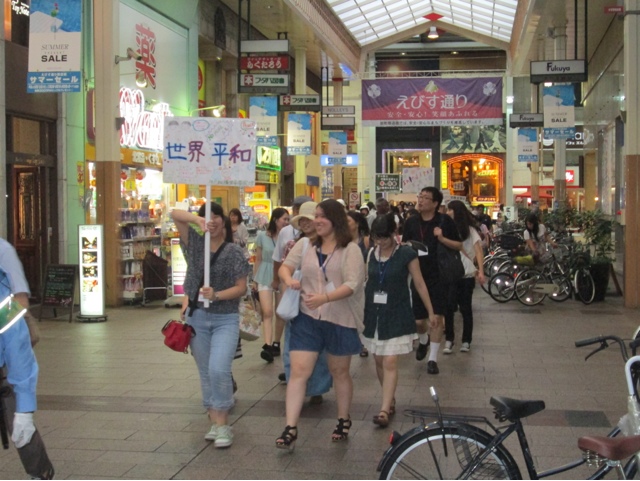
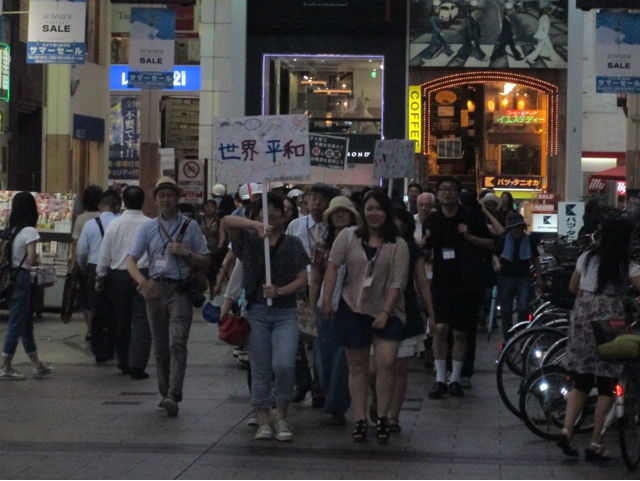
"Heiwa odori" - "Peace Avenue" (or "Peace Dance Avenue" - I can never get my "o dori" vs "odori" straight)
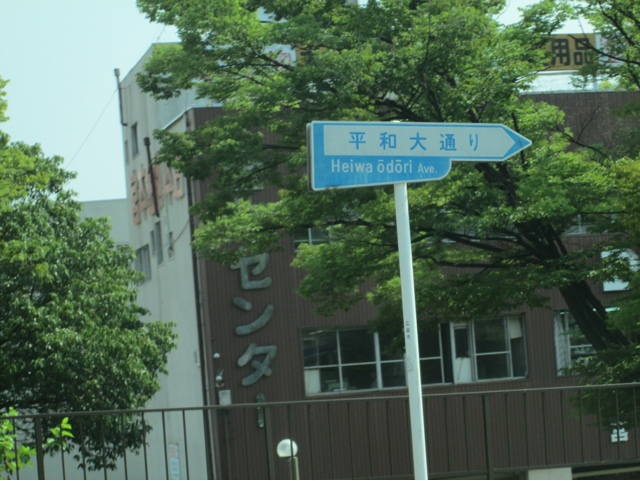

The city's tourism sector trades on the "Peace Brand" ...

In the park:
We entered from the rear of the park, and so it was with sudden surprise that I rounded the corner and came face to face with the ruins of the old domed Hiroshima exhibition hall. That's the infamous only-building-left-standing by the bomb, thanks to an ironic trick of physics, because it was directly below the explosion. Ever since, it's been left as a grim, half-destroyed monument. It was like when you first find yourself in front of any structure that you've until now only seen in pictures. It doesn't seem real, or it seems smaller or bigger (in this case, the latter) in person, or you just generally find youself "caught in the headlights," unsure if you're feeling what you're "supposed" to feel in a situation like this.
That feeling. Just heavier. There was emotional humidity in the air, as well as meteorological.
That feeling. Just heavier. There was emotional humidity in the air, as well as meteorological.

At the center of the park is a cenotaph holding the remains of most of the 70,000 identified victims, to which (I believe) additional ashes are added every time another survivor dies. The cenotaph lies between an eternal flame and an incense burner, both of which were magnifying the increasingly hot and stiltifying weather.
Already, lines of pilgrims were processing, burning sticks and laying flowers. As the hours wore on, this line grew and grew into the thousands. As a veteran of many peace rallies, I know that such events attract all sorts, some more directly plugged into the "official" cause than others. On the peace park grounds alone, I saw my share of antiwar protestors, mourners, Buddhist monks, Christian ecstatics, school groups, tourists, and just the plain curious. Outside the grounds, behind police cordons, I could hear more virulent groups shouting on loudspeakers - I didn't understand the Japanese, but the tone was unmistakeable. Regrettably, I didn't manage to get close enough to see any of them.
Inside the park, though, the mood was solemn and entirely peaceful. A veritable army of white-shirted volunteers provided everything from water to towels to flowers. Mist-machines, installed at various locations, at first seemed insane devices to use on such a humid day, until the genius of it hit us: as they clouded the air, they diffused the direct, blasting sunlight. Recorded announcements asked people to stay hydrated and to be mindful of others - "don't use a parasol, or if you must, be careful not to poke anyone with it."
I had expected more Westeners. As I spent the morning mingling and circling, I saw just a handful of white faces in the crowds, and every one I got close enough to hear was speaking a language other than English. No one identifiably "American" in sight.
Already, lines of pilgrims were processing, burning sticks and laying flowers. As the hours wore on, this line grew and grew into the thousands. As a veteran of many peace rallies, I know that such events attract all sorts, some more directly plugged into the "official" cause than others. On the peace park grounds alone, I saw my share of antiwar protestors, mourners, Buddhist monks, Christian ecstatics, school groups, tourists, and just the plain curious. Outside the grounds, behind police cordons, I could hear more virulent groups shouting on loudspeakers - I didn't understand the Japanese, but the tone was unmistakeable. Regrettably, I didn't manage to get close enough to see any of them.
Inside the park, though, the mood was solemn and entirely peaceful. A veritable army of white-shirted volunteers provided everything from water to towels to flowers. Mist-machines, installed at various locations, at first seemed insane devices to use on such a humid day, until the genius of it hit us: as they clouded the air, they diffused the direct, blasting sunlight. Recorded announcements asked people to stay hydrated and to be mindful of others - "don't use a parasol, or if you must, be careful not to poke anyone with it."
I had expected more Westeners. As I spent the morning mingling and circling, I saw just a handful of white faces in the crowds, and every one I got close enough to hear was speaking a language other than English. No one identifiably "American" in sight.

Folks we met:

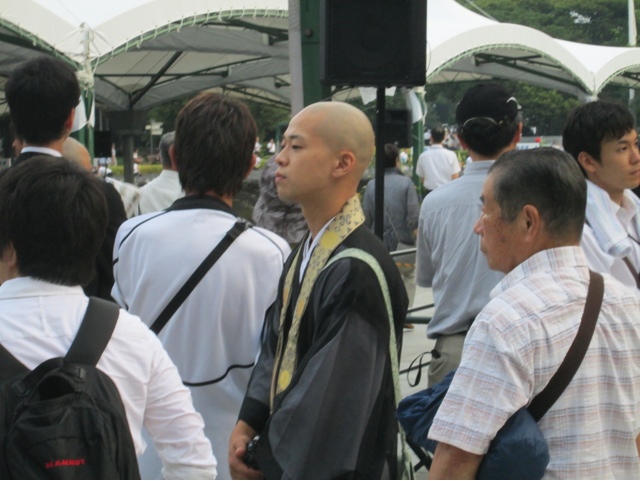


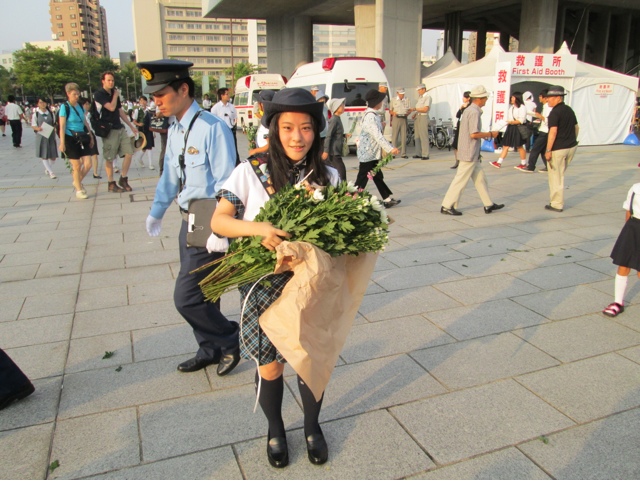
Praying for the dead, and for the living:

Line of pilgrims:
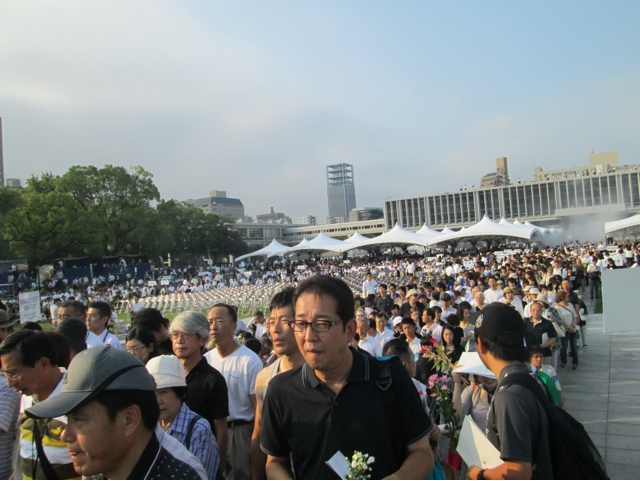


The official ceremonies begin:

I was surprised at how much access I had, climbing around and taking photos. Although cops and official-looking people were everywhere, no one batted an eyelash at this weird white dude, completely underdressed in his Dalai Lama tee-shirt (most everyone else was in business casual to formal wear, despite the weather), running around taking snapshots and video of everyone and everything, even when obvious muck-a-mucks were there.
And muck-a-mucks there were aplenty. The city council of Hiroshima laid a wreath at the cenotaph. Japanese Prime Minister Shinzo Abe was present, and spoke. UN Secretary General Ban Ki Moon was listed as a speaker, but sent a flunkie instead.
The ceremony was almost entirely in Japanese, but the program had an English page for explanation. On the one hand, the rituals were all extremely solemn: City officials offered water at the altar, in memory of the victims who threw themselves into the river in a vain attempt to slake their radiation-sickness-induced thirst. Descendants and families of the victims were called up to place offerings. Two children from a Hiroshima Jr High School made a speech, as did all manner of officials, and I caught enough words to get the gist: prayers for peace, all the world over...trying to take Hiroshima's suffering and turn it into a productive call for nuclear disarmament. Putting a face on victims, past, present, and potential, of war.
And yet the weird dissonances remained. The brass-band present played music that sounded straight out of a Danny Elfman BATMAN score...melodramatic, Hollywoodish, invoking images of "bif, pow, blam!" It seemed wildly inappropriate to the events it was backgrounding. Or the multiple statements of reverence and respect for the Hibakusha (the bomb victims), hailing them as ambassadors of peace, when I know that for generations they were ostracized, treated as pariahs, blamed for the shame of suviving and shunned for the radioactive and reproductive threats they were seen as. There was no formal acknowledgement (let alone apology!) that I could tell, of this history.
Then there was the fact that the speaker's list included several UN dignitaries, but no Americans. I wondered whose choice this was, and why. Ours? Theirs? Mutual agreement? Just a quirk of this year, and in other years it's different? It made some the rhetoric about peace ring depressingly hollow when the two former enemies who created the conditions that led to this memorial don't share any public and symbolic act of reconiciliation?
Apparently Oliver Stone was in town today. Go figure.


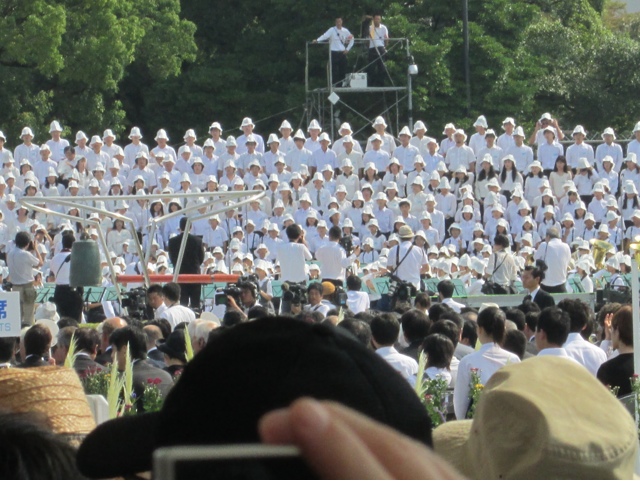



At the end they released hundreds of doves into the air (in Japanese, there is no linguistic distinction I can determine between doves and pigeons...even in English, it's the same bird, just a matter of context), a chorus led the crowd in a Japanese song for peace, and then everyone dispersed in an organized fashion.
Josh and I got snagged by a teacher with two jr. high school students who were clear being assigned to practice their English with a pre-scripted interview about what we thought of the proceedings. I think I wigged them out a bit by asnwering all their questions in Japanese. They gave us little cardboard doves at the end. Very cute.
That was it. Within about two hours the city was entirely back to business as usual, with no sign the ceremony had ever taken place at all.
And muck-a-mucks there were aplenty. The city council of Hiroshima laid a wreath at the cenotaph. Japanese Prime Minister Shinzo Abe was present, and spoke. UN Secretary General Ban Ki Moon was listed as a speaker, but sent a flunkie instead.
The ceremony was almost entirely in Japanese, but the program had an English page for explanation. On the one hand, the rituals were all extremely solemn: City officials offered water at the altar, in memory of the victims who threw themselves into the river in a vain attempt to slake their radiation-sickness-induced thirst. Descendants and families of the victims were called up to place offerings. Two children from a Hiroshima Jr High School made a speech, as did all manner of officials, and I caught enough words to get the gist: prayers for peace, all the world over...trying to take Hiroshima's suffering and turn it into a productive call for nuclear disarmament. Putting a face on victims, past, present, and potential, of war.
And yet the weird dissonances remained. The brass-band present played music that sounded straight out of a Danny Elfman BATMAN score...melodramatic, Hollywoodish, invoking images of "bif, pow, blam!" It seemed wildly inappropriate to the events it was backgrounding. Or the multiple statements of reverence and respect for the Hibakusha (the bomb victims), hailing them as ambassadors of peace, when I know that for generations they were ostracized, treated as pariahs, blamed for the shame of suviving and shunned for the radioactive and reproductive threats they were seen as. There was no formal acknowledgement (let alone apology!) that I could tell, of this history.
Then there was the fact that the speaker's list included several UN dignitaries, but no Americans. I wondered whose choice this was, and why. Ours? Theirs? Mutual agreement? Just a quirk of this year, and in other years it's different? It made some the rhetoric about peace ring depressingly hollow when the two former enemies who created the conditions that led to this memorial don't share any public and symbolic act of reconiciliation?
Apparently Oliver Stone was in town today. Go figure.

Prime Minister Shinzo Abe:




Release of doves:

At the end they released hundreds of doves into the air (in Japanese, there is no linguistic distinction I can determine between doves and pigeons...even in English, it's the same bird, just a matter of context), a chorus led the crowd in a Japanese song for peace, and then everyone dispersed in an organized fashion.
Josh and I got snagged by a teacher with two jr. high school students who were clear being assigned to practice their English with a pre-scripted interview about what we thought of the proceedings. I think I wigged them out a bit by asnwering all their questions in Japanese. They gave us little cardboard doves at the end. Very cute.
That was it. Within about two hours the city was entirely back to business as usual, with no sign the ceremony had ever taken place at all.
We took a train out to Miyajima island to de-stress a bit, but that's a story for next entry. I'm still left processing the whole event, my camera loaded with photos and video footage...trying to do "my part" to present this to my students and invite them join in the grappling-with-this process. I tell myself that this makes some small quantum of difference, like some weird generative version of the radioactive fallout that lasts through generations.
I will say that in Miyajima, and later on the platform back to Hiroshima, we met a well-put together looking college student from Oberlin who was traveling through Japan after visiting her father in Kyushu. Blonde, blue-eyed, stepped-right-out-of-a-J-crew-catalog look. We asked her if she was in Hiroshima for the Peace Day ceremonies, and she smiled pleasantly. "Oh, I didn't even know any of that stuff was happening today." She'd obliviously, unapologetically, been spending the day elsewhere in the city as a tourist, and seemed utterly undisturbed by this new information.
For the life of me, I can't at the moment figure out whether to feel disappointed in her, or to think she somehow got it right.
- D
I will say that in Miyajima, and later on the platform back to Hiroshima, we met a well-put together looking college student from Oberlin who was traveling through Japan after visiting her father in Kyushu. Blonde, blue-eyed, stepped-right-out-of-a-J-crew-catalog look. We asked her if she was in Hiroshima for the Peace Day ceremonies, and she smiled pleasantly. "Oh, I didn't even know any of that stuff was happening today." She'd obliviously, unapologetically, been spending the day elsewhere in the city as a tourist, and seemed utterly undisturbed by this new information.
For the life of me, I can't at the moment figure out whether to feel disappointed in her, or to think she somehow got it right.
- D
















No comments:
Post a Comment